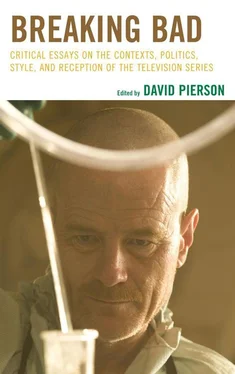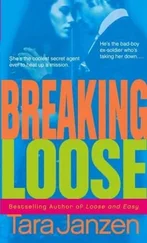The relationship between Walter and Krazy-8 in the third episode is based on a disequilibrium or asymmetry of power, in Foucault’s terms, because Krazy-8 is held captive in the basement while Walter is charged with ending his life. In contrast, Walter’s relationship with his wife, Skyler, over the course of his increasing involvement in drugs and her increasing awareness of his involvement, more closely resembles the way Foucault defines relations of power in purer form.
For instance, Walter’s dealings with Gus Fring (Giancarlo Esposito) are dominantly situated within the framework of coercive power through Gus’ very overt threats of violence or death to Walter’s person or to members of his family. In turn, these threats demand the response of similar acts of coercive power: physical actions such as executing Gale (David Costabile), Walter’s former lab assistant and, ultimately, killing Gus (although it is worth noting that in both instances Walter finds someone else to commit the actual act of murder).
In contrast, relations of power based in emotional strategies dominate Walter’s relationship with Jesse. The two draw the line at engaging in coercive power—acts of physical harm beyond the fist fights they have with each other—nor will they allow others to do so, on occasion each having committed murder to rescue or protect his partner. However, emotional strategies of power between the two are fair game and, to Walter’s mind, do not have to be played fairly. [4] This indicates that emotional strategies come equipped with their own rules and procedures regarding what are acceptable versus abusive means to an end. Thus, when Walter poisons Brock (Ian Posada), the young son of Jesse’s girlfriend, in order to get Jesse to agree with him on a certain course of action, Walter is understood to have gone too far. Yet, for most of the series Walter draws the line at directly endangering Jesse’s life by, for instance, poisoning him in order to coerce agreement.
None of this is to suggest that emotions are absent from coercive acts of power. Between Walter and Gus pride, anger, frustration, and the desire to prove oneself superior all figure as motivations in their engagement. And certainly, coercive power enacted through physical deeds clearly is possible in domestic relations, for instance, through physical abuse, economic deprivation, and so on. In the case of Walter and Skyler, however, these do not predominate. Instead, acts between them principally are committed for their emotional value and impact.
At the beginning of season three, having realized that her husband is involved in illegal activities, Skyler demands that Walter move out of the family home and starts divorce proceedings. Skyler threatens to turn Walter into the authorities if he does not stay away from the house and their two children, whom she believes Walter has placed at risk as a result of his involvement in the drug business. Skyler’s leverage, then, is constituted in her ability to give Walter up to legal forces which, if put into effect, would comprise a coercive act. Simultaneously, however, she repeatedly refuses to explain to her teenage son, Walter Jr. (R.J. Mitte), or to her sister Marie (Betsy Brandt) and brother-in-law Hank, “what Walter did,” despite their frequent demands or requests to know.
Skyler’s refusal to allow Walter to see his own children seems especially harsh and punitive to Walter Jr., Marie, and Hank. However, she cannot explain the situation to Marie or Hank, the DEA agent, because doing so, in fact, would be to turn Walter in. Further, as Skyler explains to her lawyer, she does not want her son to find out that the father he so admires is a criminal. As a result, she bears the opprobrium for the marital separation and Walter’s estrangement from his children, the negative perceptions of which she does nothing to refute or clarify to others. The blame she incurs from her teenage son is particularly cruel; he either rails at her with fierce anger, for example, calling her a “bitch,” or ignores her, refusing to speak to her or otherwise interact.
For his part, Walter denies the gravity of the situation, insisting their separation is temporary. He believes Skyler will alter her stance once he has explained to her that everything he has done has been unselfish because he has acted in what he believes is the best interests of the family. Referring to the great sacrifices he made for the family, Walter fails to listen to Skyler or respect her wishes. Perhaps most disconcertingly, he allows—even encourages—his son and other family members to believe the marital separation and his banishment from the children are the result of Skyler’s inexplicable, unreasonable impulsiveness. He does so, in part, because Walter cannot bear to be perceived as a bad guy and so permits that characterization to fall to Skyler. Additionally, he believes he can use her apparent status as guilty party in order to exert more emotional pressure on Skyler to relent, due to the pain her son’s anger is causing her.
While Skyler takes responsibility for what is not her doing in order to protect others, Walter refuses to be held responsible for that which he is indeed culpable. Further, as Skyler continues to spurn his attempts at reconciliation or to accept the justifications he makes for his actions, Walter grows increasingly frustrated and angry. His lawyer, Saul (Bob Odenkirk), assures Walter that Skyler will not make good on her threat to give him up to the authorities due to the ensuing repercussions. These include professional embarrassment and potential job loss for her DEA brother-in-law, trauma to her children because their father is a drug dealer and their mother turned him in to the police, and the risk of having her home confiscated as the proceeds of drug sales. Following this conversation, Walter unilaterally moves back in by breaking into the house in order to circumvent the locks Skyler has had changed.
When Skyler returns home, she finds Walter there refusing to leave and, thereby, forcing his presence upon her:
Walter: It’s my house too, Skyler. I’m staying. End of story.
Instead of departing as she repeatedly demands, he openly challenges her to turn him in. Skyler does call the police but, perhaps for all the reasons Saul has outlined, cannot bring herself to provide them with the full story. She tells the police only that Walter is there “against my will.” When the officer explains they need legal grounds to remove him and pointedly asks Skyler if Walter has broken any laws, we see her struggle over whether to speak. At this moment, the other officer asks Walter Jr. his impression of events.
Walter Jr.: It’s my mom’s fault. She won’t even say what my dad did…. I don’t know why she’s being this way. My dad, he is a great guy.
Rather than react to the unfair accusations being made against her, Skyler is silenced by the feelings her son has for his father. She cannot bring herself to disillusion him. This marks the moment of Skyler’s defeat and Walter’s victory over her. [5] Skyler explains to her lawyer, the only person she ever confides in, that instead of having her family pay all the material and emotional repercussions for Walter’s illegal activities, her plan is to wait until her husband’s lung cancer ‘resolves’ the situation for them.
The threat to surrender Walter to the authorities has been Skyler’s only power over him. Her inability to make good on Walter’s dare has undermined what little power she has within the family. Power now reverts to Walter. Skyler becomes his emotional captive, just as Krazy-8 previously was his physical prisoner, as Walter forcibly reclaims what he perceives as his rightful place in the home and with the family.
Читать дальше












